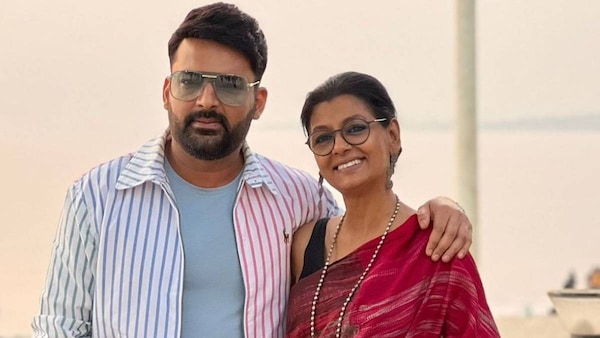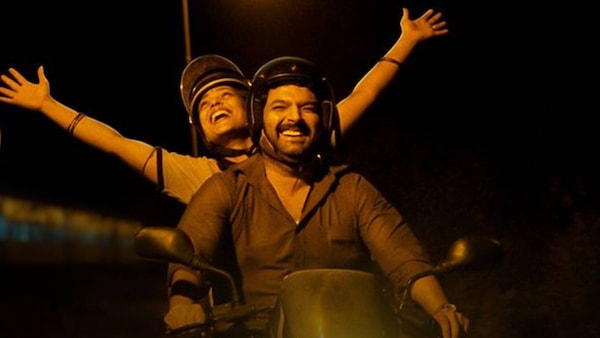The Nandita Das Interview | 'Kapil & I Have A Natural Synergy'
The actor-director talks about her latest film, Zwigato; her leading man Kapil Sharma; and why she views films as mirrors. Mallik Thatipalli interviews:

Last Updated: 03.34 AM, Mar 26, 2023
NANDITA DAS has always followed her heart, be it as an actor or director. Her latest directorial venture, Zwigato, has earned acclaim from several quarters and is a week into its theatrical release in India. Das speaks exclusively with OTTplay:
What made you choose a delivery boy as the protagonist in Zwigato, someone who is invisible in contemporary Hindi cinema?
Increasingly, the working class is becoming invisible in our films. They only show up when something very sensational or dramatic happens in the story. Otherwise, they are largely not really thought of in our collective consciousness. During COVID, we realised how secure [some of us] were while another section was extremely vulnerable. In some ways, the disparities that already existed in our society — whether of gender, class, caste and religion — seemed more acute and the gig economy seemed like a saviour for the rising anxiety around unemployment and joblessness. I thought it would be relevant to be able to tell a story of a gig worker within the mashup of technology and traditional society. I realised that in a four-day story, you can say so much that is hidden in plain sight.
From Manto to Zwigato, it has been a 180-degree turn; how do you tune in and out of subjects as diverse as these? Or is directing a film the same, irrespective of the genre and story?
Every film is different, the character, the story arc, and what you want to say through it. What is common for me is that my concerns remain the same. I’ve always been very interested in subjects that deal with the process of othering and the prejudices, fears and dilemmas that people have. These have been the common themes in all [my] three films. Manto was a biopic set in the 1940s… a period film, but I did it as I felt it was relevant to our times. For me, films are a mirror where we can see ourselves. I’m not trying to teach or give a message but I hope everyone who watches it finds something that they take away or are disturbed by, in the hope that they do something about the disturbance. The process of direction is that with every film you grow, you learn and for me, these are just stories I’m compelled to tell. The treatment of the film is decided by the story.

How did the story of Zwigato emerge? Was it a personal story you heard or read?
There were many stories. For me everything that’s personal is what I see, I read, and I care about. It needn’t necessarily happen to me or my family. As I started researching, I spoke to many riders and everything I saw through my social work and during my acting days when I travelled to different parts of the country, found its way to get into the script. Subconsciously we store so many thoughts, ideas and feelings that when you create something they find ways to manifest through that story
Kapil Sharma’s casting has been much discussed. I think it was a masterstroke to show him in a different light…why did you choose him and how did you mould him into the character?
I had never seen his show before casting him so I wasn’t trying to show him in a different light or change his image. I thought he was right for the character when I saw a clip of him online. I thought there was something genuine about him; even though he is no longer an ordinary person, he talks like an ordinary person; those lived experiences he had — he remains very rooted in them. He was initially surprised (when offered the role) but then he was happy to work on the film. There is a natural synergy between us even though we come from different worlds. We talk about everything and though we purportedly come from different worlds — me, from serious cinema; Kapil, from comedy — I believe that he has a serious side and (hopefully) I have a funny bone, and we happily meet midway.
Did you expect the tremendous word-of-mouth and goodwill the movie generated?
People are intrigued by this combination of Kapil and me. The subject is very contemporary, relevant and topical. People want to see stories about the real world too, they don’t want to see only escapist cinema. I’m hopeful that the film will resonate with many people.
We’ve seen different Indian movies doing well and RRR recently won Best Song at the Oscars. As someone who has been a part of the film industry across genres and languages, how do you see the success of regional Indian cinema?
It’s great that both RRR and The Elephant Whisperers have done so well. I acted in many regional films; half of my work is in regional languages, and it always received second-grade treatment. Now with OTT we have access to cinema from different parts of India and the world. It has opened our own eyes as there is so much out there to see.
It’s been a while since we’ve seen you onscreen . Why have you stayed away and what will get you back?
I’ve been offered some roles but direction is very consuming and it’s not easy to take out time from it. I do hope to do some acting soon.
What’s next for you? What are you looking forward to?
I’m researching for a project. The gap between Firaaq and Manto was10 years, and between Manto and Zwigato has been five years, and hopefully [for] the next film, will be less than that. Meanwhile, I hope Zwigato gets all the support it needs and hopefully it will encourage film makers, distributors and producers to make more such films.
